SPECIAL REPORT
By Raymund B. Villanueva
National Democratic Front of the Philippines (NDFP) peace consultant Randy Malayao can only shake his head as he looked at photos of the landslide in Itogon, Benguet last month that reportedly killed 69 residents, majority of whom were miners and their families. Initial reports said the tragedy was brought about by the torrential rains brought about by typhoon “Ompong” that wreaked havoc all over Northern Luzon. Eventually, however, it was accepted that the typhoon only triggered the disaster and that mining activities in the area—both large and small scale—was its main cause.
“It should not have come to this,” Malayao said. “This could have been prevented if only the Manila government listens to the people,” he added.
Since his release from prison as a political detainee in 2012, Malayao has resumed his work as a consultant of the NDFP’s negotiating panel, attending formal negotiations in Europe and reciprocal working group meetings in the Philippines and abroad. As the NDFP’s resource person from Northern Luzon, he is intimate with mining issues in his home region of Cagayan Valley, as well as the Ilocos Region and the Cordilleras. Environmental protection was one of his advocacies that made him a victim of abduction and intense torture in the hands of the Philippine Army. He spent four and a half years inside various jails as a political prisoner.
“The countless discussions I attended on what makes our people poor, especially the peasants, opened my eyes that environmental degradation contributes to their poverty, contrary to what has been promised them for more than a hundred years. Mining activities in Northern Luzon has made its people poorer,” he said.
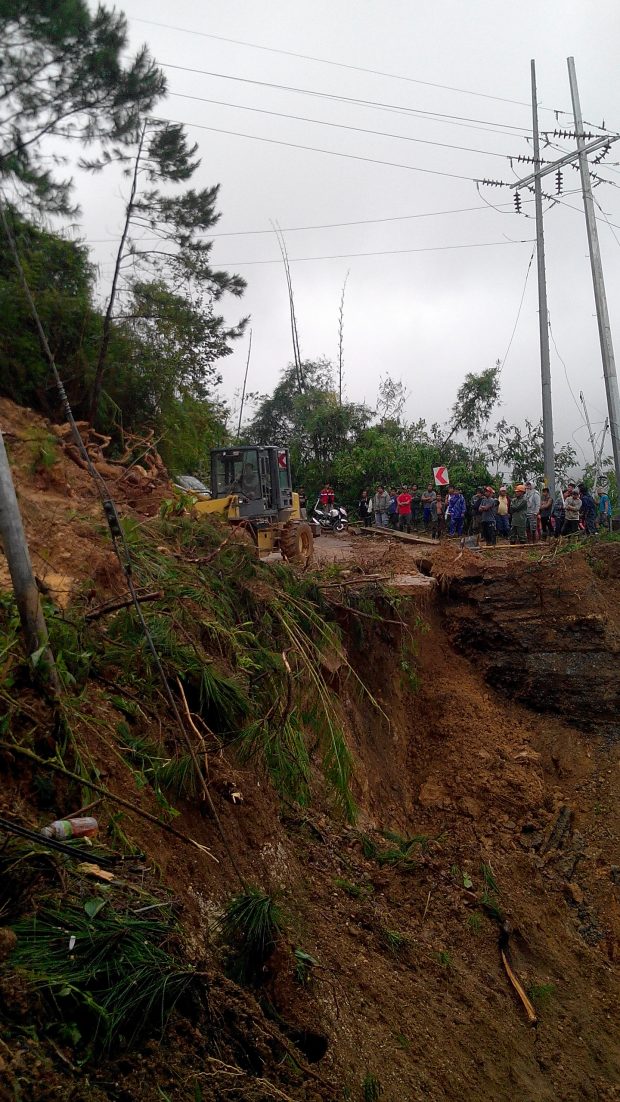
Rescuers try to clear part of the landslide in Barangay Ucab, Itogo, Benguet that killed 69 residents. (Photo by Kim Quitasol)
The victims of the Itogon landslide are a case in point. Malayao said that mining activities, primarily when mining giant Benguet Corporation was active in the area, caused its forest cover to be denuded and its soil unstable. The landslide last month was only the latest in a string of similar incidents and it is unfair to blame the victims who he suspects are allowed to continue their activities with the consent of the company that still owns the mining licenses in the area.
Northern Luzon is one of the Philippines’ mining hotspots. Gold, copper, and molybdenum are mined in Nueva Vizcaya; gold and nickel are extracted in Isabela; gold has been mined in the Cordilleras for hundreds of years, and gold and magnetite (also known as black sand) are mined in the Ilocos Region and Cagayan Province’s coastal and offshore areas. As a mountainous area, the regions are also a prime source of sand and gravel as well as lumber. But despite the nearing depletion of its mineral wealth, it is agriculture that keeps the regions’ economy afloat. While it has enriched a few corporations beyond belief, mining has only kept many of its residents in poverty. Not a few have lost in their lives.
It was because of this situation that the NDFP has pushed for environmental protection, rehabilitation and compensation as one of the top agenda under the substantive issue of social and economic reforms of the peace negotiations between itself and the Government of the Republic of the Philippines (GRP).
CASER and the environment
It was as far back as September 1, 1992 that both the GRP and the NDFP agreed in the document called The Hague Joint Declaration to discuss social and economic reforms to address “the root causes of armed conflict.” Both parties agreed that a Comprehensive Agreement on Social and Economic Reforms (CASER) is a program that could end poverty and other social problems. It was only recently, however, that a section on environmental protection was finally approved, even if the issue had always been on the table for more than 26 years already.
“[NDFP’s] latest version of [its draft] CASER is the result of careful study and analysis started in the middle of 2016. The NDFP Reciprocal Working Committee on Social and Economic Reforms (RWC-SER) looked at the relevant experience and practice of the revolutionary forces in the cities and, especially, the countryside,” the NDFP said in the preface of its book on the peace talks agenda.
As expected, the NDFP had been scathing in its assessment of the state of environment in the
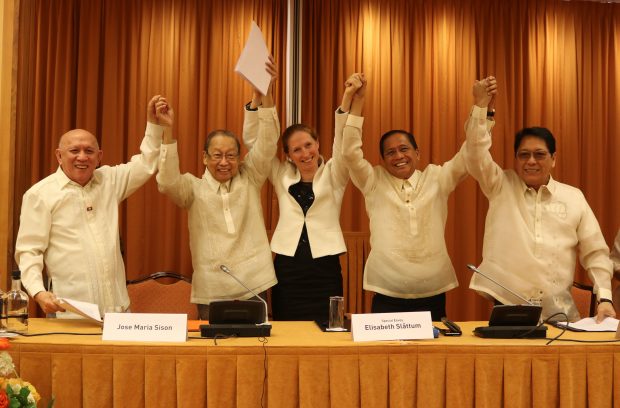
Philippines, especially mining.
“Corporate mining depletes our minerals as well as destroys forests and mountains. National minorities are displaced from their communities and ancestral lands. Critical resources for national industrialization are lost,” the NDFP said. “The profit-driven nature of capitalist production with the particular neo-colonial pattern of production and trade, that overrides social and ecological considerations has been the main factor in the devastation of the Philippine environment and the consequent disasters that have plagued the country,” the NDFP explained.
It may come as a surprise to most, however, that under its CASER proposal, the NDFP is not against mining. Rather, the NDFP says it is for responsible and pro-people mining.
NDFP urges environmental protection with economic development
For the NDFP, mining is not evil. It only becomes so because the environment is being destroyed by current mining practices and it only benefits members of the local ruling elite and foreign economic interests.
The NDFP said that environmental protection, conservation and the wise use of natural resources are necessary components of socio-economic development policies and that ecological balance is integral to national development.
By this, it means two things.
First, current destructive mining practices must be stopped and replaced with more environment-responsive ways. Not a few were surprised when the NDFP expressed full support to former GRP environment secretary Gina Lopez when she ordered the ban on open pit mining and a review of all mining activities nationwide. In turn, Lopez said she was willing to work with the revolutionary New People’s Army (NPA) in protecting the environment. This prompted the NDFP to invite Lopez to attend the NDFP-GRP formal peace negotiations in Europe to present her views the Left said were in accordance with its programs on the environment.
“The desire of Gina Lopez to work with the NPA for peace and development is welcome by the NDFP. It is directly related to the environment, agrarian reform and rural development now being negotiated under the substantive item Comprehensive Agreement on Social and Economic Reforms,” NDFP chief political consultant Sison said. “It will be fine if Gina attends the fifth round of formal talks,” Sison added.
Lopez told Kodao she would accept the invitation provided she would be confirmed by the powerful Commission on Appointments. “Yes, I’ll go,” Lopez said. “What I would want to do is to create models first than just talking. What I would like to do is to work with the NPA and create models where we get people out of poverty in like six months to a year. Then I’ll go talk to him (Sison): ‘Sir, look at what we did here. What if we do these everywhere?’” Lopez explained.
Lopez was eventually rejected by the CA and Duterte decided to not reappoint her controversial environment secretary.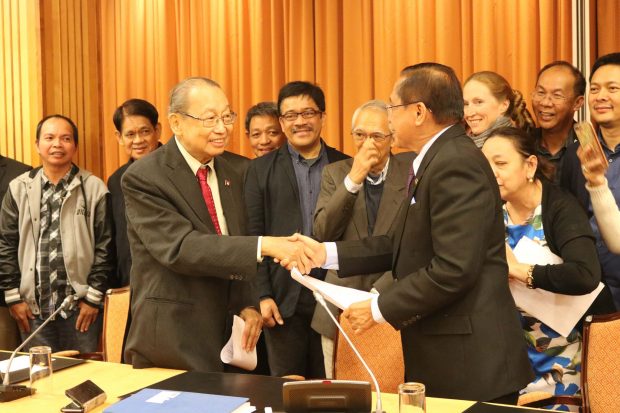
Second, the NDFP wanted that upon signing of the CASER, most of the raw materials from the country’s mining activities would stay in the country to be used for its national industrialization drive. “The strategy of export-led economic growth has opened the country’s natural resource to control and plunder by the foreign monopoly capitalists, big comprador bourgeoisie and bureaucrat capitalists. As the imperialists and the local exploiting classes freely siphon off the nation’s natural wealth, they leave behind a ravaged environment, Industrial wastes like mine tailings and carbon monoxide emissions and unsafe agricultural products pollute and destroy the environment,” the NDFP said.
The group added that existing laws such as the Mining Act of 1995 mean the wholesale delivery of the national patrimony to the unbridled exploitation by foreign investors through the liberalization of the mining industry. They open the door wider to the destruction of the environment and the displacement of the national and ethnic minorities from their ancestral lands.
Under Section 2 of NDFP CASER’s principles of environment protection and economic development, the group proposes that the parties “…commit to pursue economic development with due regard to the protection and efficient use of the country’s renewable and non-renewable resources and to institute measures for ensuring a healthy national environment.”
GRP panel’s ‘surprising’ draft
It was not only the NDFP that sprung surprises in its environment protection drafts of the CASER. The GRP was not to be outdone when it submitted its own environmental protection, rehabilitation, and compensation draft after the fourth round of formal talks in Noordwijk An Zee in The Netherlands in June 2017.
“The GRP’s draft has many provisions similar to NDFP’s. While there are differences between their drafts and ours, there are enough similar provisions that could be the foundation of a favorable agreement on this issue,” an NDFP source told Kodao.
For example, on the issue of mining, the GRP RWC-SER’s draft said that the pursuit of economic development must integrate protection, efficiency, and just use of the country’s resources and ecology, including making sure that the carrying capacity of the environment is not breached.
Taking a cue from the NDFP draft, the GRP draft, under Section 6 of its draft Priority Actions for Sustainable Development and Environmental Justice, says that all mining operations are to be regulated “to ensure domestic processing of mineral resources, guarantee environmental protection and justice, safeguard mine workers, compensate communities for damages, uphold democratic consultation and the consent of communities, allocate mining revenues and benefits equitably, and charge the costs of mine maintenance, disasters and rehabilitation to the revenues of mining firms.”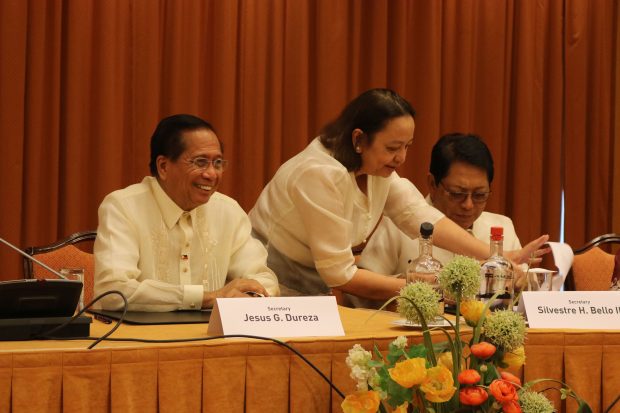
Support from environmentalists
Kalikasan People’s Network for the Environment national coordinator Leon Dulce hailed both the NDFP and GRP negotiators’ respective drafts as steps towards the protection of the environment and national development.
“What both parties have shown is that, at the very least, they were willing to discuss how mining could be more environment-responsive and beneficial to the Filipino people at the same time,” Dulce said.
Kalikasan said the country may have around 7.1 billion metric tons of metallic mineral reserves (such as gold, copper) and nickel) and 51 billion metric tons of non-metallic deposits. “The total revenue of these reserves may be worth US$1 trillion, ten times the country’s gross domestic product and 14 to 17 times larger than its entire external debt,” the group said.
Like the NDFP and GRP’s drafts on environment protection, Kalikasan seeks a reversal of the nature of the country’s mining industry.
“In forums and symposiums organized and attended by Kalikasan, including congressional hearings on the People’s Mining Bill (House Bill 2715, filed by Bayan Muna) that we are suporting, we have always said that the mining industry should be geared towards national industrialization,” Dulce said.
Kalikasan said that the mining industry should be redefined for the production of raw materials—such as base metals, basic chemicals and petrochemicals needed by the basic, medium and heavy industries—to produce as much consumer, intermediate and capital good with the country’s stock of finite mineral and non-mineral industrial raw materials and in the process provide jobs to the country’s vast human resources.
“In other words, our country should not be exporting everything that is mined within our territory because we need them for when we finally industrialize. And that may be possible if the GRP and the NDFP agree to sign a CASER and honestly implement it,” Dulce said.
The environmental activist also clarified that under both the NDFP and GRP drafts of the CASER as well as HB 2715, that the drafts are not necessarily against foreign mining corporations.
“I think these documents clarified that as long as these foreign mining corporations have no bad records and they agree to contribute to national industrialization, they are welcome,” he said. The People’s Mining Bill says that the State shall in cases allow foreign corporations to invest in the mineral industry.
“Based on the National Industrialization Program and the country’s capability and capacity, the government must identify the mineral areas where foreigners can help and invest subject to rigorous screening and strict regulations…The participation of foreign companies in the critical stages of mineral extraction and processing shall be in accordance with a mandatory program or agreement for technology transfer and equity shares that do not exceed 40 percent of the full capital requirements,” HB 2715 reads.
“Alas, the GRP principal (Duterte) is unwilling to continue the talks,” Dulce bewailed.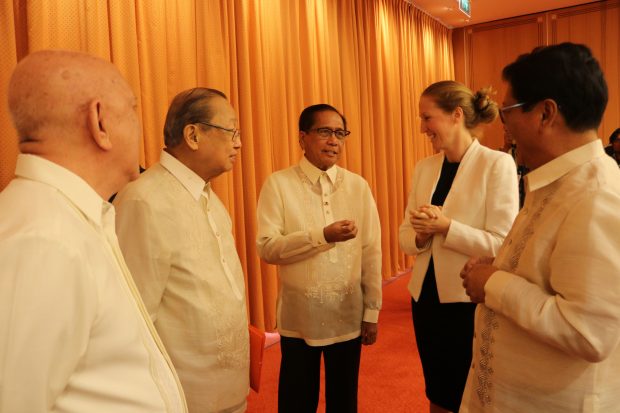
Wasted opportunity
Malayao agrees with Dulce that Duterte is wasting the opportunity to have an environmental protection agreement signed with the NDFP.
“I could not begin to describe to you the hard work put into crafting both the NDFP and GRP drafts on environmental protection under the prospective CASER. It was supposed to have been discussed as early as June 2017 by the negotiating panels,” Malayao said.
A signed agreement between the GRP and the NDFP is a binding and legal document, Malayao explained. Even without a final peace agreement, both the GRP and NDFP can already implement its provisions, as they did with their agreement on human rights and international law when they established a joint monitoring office in 2004.
“If the CASER was signed and implemented last year, perhaps extractive activities in Itogon, as well as in Naga City in Cebu Province, could have been more strictly regulated. Perhaps, the near simultaneous tragedies last month would have been averted,” Malayao said. #





